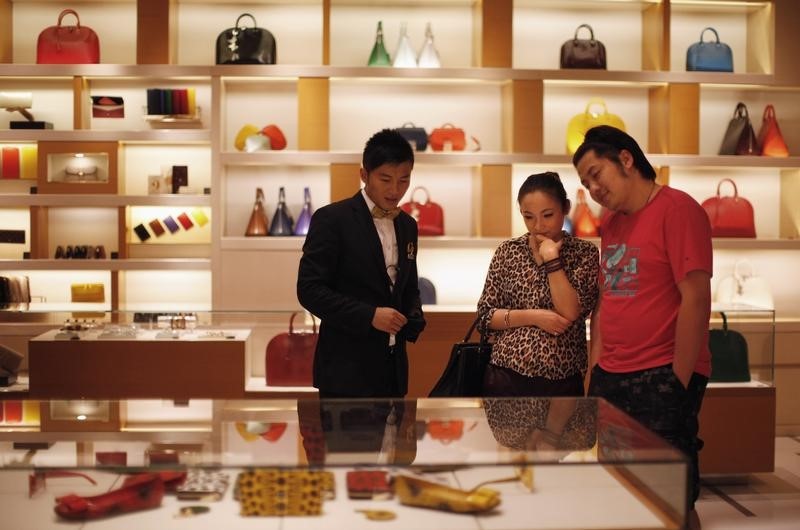By Farah Master and Astrid Wendlandt
HONG KONG/PARIS, April 1 (Reuters) - China is raising fees
on packages ordered from abroad and cracking down on smugglers
who carry in suitcases full of luxury goods, in a concerted
effort to encourage shopping at home and squeeze a grey market
that shoppers use to avoid tax.
Although Chinese shoppers account for a third of global
sales of luxury goods, sales that actually take place in
mainland China account for only a fifth.
The rest are purchases made abroad -- either ordered from
overseas websites, bought by Chinese tourists, or smuggled in by
"personal shoppers" known as daigou, who fill suitcases with
luxury items and sell them back home in person or online.
That costs the Chinese government tax revenue, and also
discourages the domestic consumption sector, particularly for
higher quality goods, that Beijing has long been trying to boost
to rebalance its economy away from exports.
"China wants to attract the outbound purchases back and
cultivate a domestic luxury consumption market which is also
consistent with the target to develop a consumption driven
economy," Yating Xu, an economist for HIS Global Insight said.
Luxury items like the latest Dolce & Gabbana bag can be
around 50 percent cheaper in Milan or in Paris than in mainland
China, although some brands like Chanel lowered Chinese prices
last year to close the gap.
Some Chinese also prefer to buy expensive items abroad
because they can be more certain the goods are genuine, and can
get better choice or service than at home.
Luxury firms have invested in opening boutiques in China,
but they sometimes sit idle, potentially damaging their brands.
The problem has gotten worse over the past year, according
to figures provided by the consultancy Bain & Co, which found
that luxury consumption in mainland China fell 2 percent in
2015, even as purchases by Chinese buyers rose 251 percent in
Japan, 31 percent in Europe and 33 percent in South Korea.
The parallel market, mostly conducted online, is crowding
out bricks-and-mortar shops, said Roth Lai, deputy editorial
director at Elle China, speaking at a conference on luxury in
Paris this week.
"E-commerce has become really the main driving force in the
luxury goods market in China," he said. "But I think the Chinese
will continue to buy outside of China for the foreseeable
future, until there is a major shift in economic structure in
China."
PENALTIES, TAXES
To combat the daigou, the Chinese government last week
increased penalties for false declarations and tightened customs
controls. Officials are catching more and more Chinese
travellers at the airport with suitcases full of luxury goods
and slapping taxes on them.
Beijing also said that from April 8 it would increase taxes
imposed on a range of goods either imported via the Internet or
carried in by daigous.
Tariffs on watches ordered from abroad were increased to 60
percent from 30 percent and on jewellery to 15 percent from 10
percent.
"We expect an adverse impact on overseas purchases by
Chinese daigous and tourists alike," said Exane BNP Paribas (PA:BNPP)
analyst Luca Solca.
China has also tightened the use abroad of UnionPay cards,
the government-supported payment card network. As of January,
there is an annual withdrawal limit at overseas cash machines of
100,000 yuan ($15,471.49) per card.
($1 = 6.4635 Chinese yuan renminbi)
(Editing by Peter Graff)
